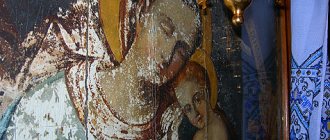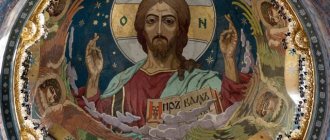God the Father, we learn that for Christians God is like a Father, all people are God's creation, created by the Creator about God's love for the human race.
I believe in one God, the Father, Almighty, Creator of heaven and earth, everything visible and invisible
Why is God called Father?
Christianity, as the only true religion, is primarily distinguished by its teaching about God. We perceive God and turn to Him as our Heavenly Parent. God is our Heavenly Father.
God is called Father because He begets the Son from eternity (this will be discussed later), but also because He is the Father to us all. In the prayer that the Lord Savior gave us, we say: “Our Father...” (Our Father, for all Christians God is the Father).
The Holy Apostle Paul says, addressing Christians: “You did not receive the spirit of slavery, but you received the Spirit of adoption as sons, by whom we cry: “Abba, Father!” This very Spirit bears witness with our spirit that we are children of God” (Rom. 8:15-16). The word "abba" in Aramaic corresponds to our "papa" - the confidential address of children to their father. Since we already believe and know that God is our Father, it is impossible not to remember fatherly love.
God is love
The Holy Apostle John the Theologian says that “God is love” (1 John 4:8). These words express the most important property of God. This determines the entire structure of a Christian’s spiritual life. Our relationship with God is based on mutual love. Heavenly Father loves us with a perfect and absolute love. We, believers, can perceive the fruits of this love only when we love God with the fullness of our being. Therefore, love for God is the first and main commandment. The Holy Scriptures reveal the basic properties of God in close connection with the Economy of human salvation.
Other properties of God
God is the all-perfect Spirit.
He is eternal. Has neither beginning nor end.
God is Almighty.
In the Holy Scriptures He is called the Almighty, since He holds everything in His power and authority. The Holy Fathers teach us not only to believe in God, but to trust Him in everything, because He is All-Good and Humane-loving.
The Lord's mercy extends to every person. If a person always wants to be with God and turns to Him, then He does not leave the person under any circumstances.
Religion
Religion is a form of thinking based on belief in the supernatural, which has a set of rules that determine the norm of human behavior and rituals characteristic of it, helping to understand the world.
Regardless of the historical period and its inherent religion, there are organizations that unite people of the same faith. In ancient times these were temples with priests, in our time - churches with priests.
Religion implies the presence of a subjective-personal perception of the world, that is, personal faith and an objectively general faith that unites people of the same faith in confessions. Christianity is a religion consisting of three faiths: Orthodoxy, Catholicism and Protestantism.
God the Father in Christianity, regardless of denomination, is the single creator of all things, Light and Love, who created people in his own image and likeness. The Christian religion reveals to believers the knowledge of one God, recorded in holy texts. Each denomination is represented by its clergy, and the unifying organizations are churches and temples.
The parable is about how God constantly takes care of us.
One ancient Byzantine manuscript contains the comforting admonition of a holy elder: “Someone told me that one man always prayed to God so that He would not leave him on his earthly path, and, as the Lord once descended with His disciples on their way to Emmaus (see. : Luke 24:13-32), so that he would go with him along the path of his life.
And at the end of his life he had a vision: he saw that he was walking along the sandy shore of the ocean (of course, mean the ocean of eternity, along the shore of which the path of mortals passes). And, looking back, he saw the prints of his feet on the soft sand, going far back: this was the traveled path of his life.
And next to the prints of his feet were the prints of a couple more feet; and he realized that it was the Lord who existed with him in life, just as he prayed to Him.
History of Christianity with the coming of the Messiah
The birth of Christianity occurred in the 1st century AD. e. in Palestine, which at that time was under Roman rule. Another connection with the people of Israel is the upbringing that Jesus Christ received as a child. He lived according to the laws of the Torah and observed all Jewish holidays.
According to Christian holy scriptures, Jesus is the incarnation of the Word of the Lord in a human body. He was conceived immaculately in order to enter the world of people without sin, and after that God the Father revealed himself through him. Jesus Christ was called the consubstantial son of God, who came to atone for human sins.
The most important dogma of the Christian church is the posthumous resurrection of Christ and his subsequent ascension into heaven.
This was predicted by numerous Jewish prophets many centuries before the birth of the Messiah. The resurrection of Jesus after death is a confirmation of the promise of eternal life and the incorruptibility of the human soul that God the Father gave to people. In Christianity, his son has many names in holy texts:
- Alpha and Omega - means that he was the beginning of all things and is its end.
- The Light of the World means that he is the same Light that comes from his Father.
- Resurrection and life, which should be understood as salvation and eternal life for those who profess the true faith.
Many names were given to Jesus by both the prophets and his disciples and the people around him. All of them corresponded either to his deeds or to the mission for which he found himself in a human body.
God never leaves a person.
But in some places along the path he saw the prints of only one pair of feet, which cut deeply into the sand, as if indicating the severity of the path at that time. And this man remembered that it was then when there were particularly difficult moments in his life and when life seemed unbearably difficult and painful.
And this man said to the Lord: you see, Lord, in difficult times of my life you did not walk with me; You see that the prints of only one pair of feet in those days indicate that then I walked alone in life, and You see from the fact that the footprints cut deep into the ground that it was very difficult for me to walk then.
But the Lord answered him: My son, you are mistaken. Indeed, you see the prints of only one pair of feet in those times of your life that you remember as the most difficult. But these are not the prints of your feet, but of Mine. Because in the difficult times of your life, I took you in My arms and carried you. So, My son, these are not the prints of your feet, but of Mine.”
Development of Christianity after the execution of the Messiah
After Jesus was crucified, his disciples and followers began to spread the teaching about him, first in Palestine, but as the number of believers increased, they went far beyond its borders.
The very concept of “Christian” began to be used 20 years after the death of the Messiah and came from the inhabitants of Antioch, who called the followers of Christ that way. The Apostle Paul played a major role in spreading the teachings of Jesus. It was his sermons that brought numerous adherents to the new faith from pagan peoples.
If before the 5th century AD. e. The acts and teachings of the apostles and their disciples spread within the borders of the Roman Empire, then they went further - to the Germanic, Slavic and other peoples.
Properties of God the Father
God has Omniscience. The entire past was imprinted in his endless memory. He knows everything and sees everything in the present. He knows not only every human act, but every word and feeling. Lord knows the future. God is Omnipresent. He is in Heaven, on earth. The contemplation of the Divine presence evokes joy and poetic tenderness in the psalmist David:
“If I ascend to heaven, You are there; If I go down to the underworld, you will be there too.
If I take the wings of the dawn and move to the edge of the sea, there Your hand will lead me, and Your right hand will hold me” (Ps. 139:8-10).
God is the Creator of all things.
God is the Creator of heaven and earth. He is the Cause and Creator of the entire visible and invisible world. Our world, the universe is incredibly complex and wisely structured, and of course, only the Supreme, Divine Mind could create all this. The entire Divine Trinity participated in the creation of the world. God the Father created everything with His Word, that is, the Only Begotten Son, with the assistance of the Holy Spirit.
God has Wisdom . Psalm 103 is a majestic hymn to God, who created everything with His wisdom and continues to care not only for man, but also for His other creatures: “You water the mountains from Your heights, the earth is satisfied with the fruits of Your works. You make grass grow for livestock, and greenery for the benefit of man, to bring forth food from the earth” (Ps. 103:13-14).
God the Father, Creator of the spiritual world.
In addition to the fact that God is the Creator of the visible, material world, He also created the spiritual world, invisible to us. The spiritual, angelic world was created by God even before our material world.
Fallen angels. All angels were created good, but some of them, led by the supreme angel Lucifer, became proud and fell away from God. Since then, these angels have become dark spirits of malice, wishing all harm to people, as God’s creation. They try in every possible way to seduce people into sin and destroy them.
But God has greatly limited their power and influence on people, moreover, every Christian has his own guardian angel who protects and protects him from evil, including from the influence of devilish forces.
Vkontakte community
God is one, but threefold - how can an ordinary believer, and not a theologian, understand this?
To help believers come closer to understanding the mystery of the Holy Trinity, the Church Fathers offered analogies from our earthly world. For example, Gregory the Theologian gave examples with the sun, its light and heat, as well as with a water source, stream and river; Basil the Great - with a rainbow divided into stripes of different colors; Blessed Augustine - with the human mind, thought and word; Dionysius the Areopagite - with three candles giving a single light. But all such “illustrations” borrowed from the earthly world must be treated as very imperfect metaphors, understanding that they inaccurately describe the relationship of the three Divine Persons and do not allow one to truly penetrate into the mystery of the Trinity being.
El Shaddai
Translated into Russian, this noun phrase means “God Almighty.” The letter combination shad is translated as “strength.” In the literal sense, this concept is deciphered as follows: “full of power, strength, strength.”
There are several other interpretations of “El Shaddai”. However, they are considered less reliable. For example, there is an opinion that the root of the word “Shaddai” comes from the ancient Akkadian “Shadu”, which translates as “mountain”. In this case, the expression itself can be interpreted as “God of the mountain.”
According to another point of view, "Shaddai" translated from Hebrew means "breast of a nursing mother." There is supposedly a connecting parallel in this, where the mother's breast acts as a symbol of God.
It is worth noting: such an interpretation was quite common in ancient times and was quite consistent with old beliefs, but it clearly does not coincide with the interpretation of the Torah and other Scriptures.
Names of God in the Bible and their meaning
The Bible often speaks about the Most High, but His name is not mentioned at all. A careful study of Scripture reveals that God is designated by three words: el, eloah, elohim. All of them are united by a common root, the meaning of which is ambiguous.
It is assumed that the root el- is translated as “to be strong”, “to be ahead”. Together with the form el-, clarifying definitions are usually used (used in the singular). Elohim (plural) is the more common form, the ambiguity of which comes down to the concepts of “God”, “a certain god”, “deity”, “certain gods”.
Note: the name “Elohim” is a Hebrew common noun (in the plural it sounds like “Eloah” or “El”, which denotes a deity among the Semites). It is found in the Old Testament Scripture, often used together with other names for God - Yahweh, Adonai and others. Its meaning comes down to the thought of the justice of the Lord.
It is noteworthy that in the Tanakh an additional definition is assigned to the word God. Taken together, an expression is formed that indicates a certain connection between God and:
- face (“God of Abraham”, “God of Isaac”, etc.);
- the place where the revelation took place (“God of Israel”);
- the people chosen by him (“God of Jacob”).
Along with the above concepts, the proper name Yahweh is also found in the Old Testament. On the pages of Holy Scripture it was depicted with the letters YHWH (the word completely lacked signs indicating vowel sounds).
In the Old Testament it was read as “adonai”, which meant “Lord”. When letters denoting vowel sounds appeared in the Hebrew alphabet, the word Y-H-V-H was supplemented with letter signs. Due to the peculiarities of the pronunciation of vowel sounds, instead of “Yahweh”, the reading, as well as the spelling, “Jehovah” was established.
Until now, a similar variation can be heard in church chants, as well as read in ancient translated sources. Due to the fact that the name "Yahweh" took on a hidden form in the form of the word "Lord", where the combination "Lord Yahweh" is used in the Semitic scriptures, researchers use various variations in order to avoid unnecessary repetition.
To summarize briefly, it should be noted that the tetragram YHWH (YHVH) means “Lord”. Another pronunciation is “Jehovah,” but it is found extremely rarely in Russian biblical texts.
In the New Testament, instead of the name Yahweh, the term “kyrios” is used, which also means “Lord”.
In the Old Testament part of the Bible Scripture there is a revelation of God in His name. God becomes Father.
In addition to proper names, the list of names for God also includes other designations:
- Almighty (means supreme power);
- Holy of Israel (expresses holiness and greatness, in contrast to the sinner);
- Lord of Hosts (means “army” - presumably the troops of the Israelites, or angels, or stars; the name means unlimited power over all things);
Please note: the concept is found in both Jewish and Christian traditions, mentioned in the Tanakh and in the New Testament. This name, in comparison with others, especially clearly puts forward the idea of omnipotence, dominion over all forces of earth and heaven. In Russian Orthodoxy, since the 16th century, icons depicting God the Father have been signed with this name.
- Redeemer (in this sense, he is a relative of the entire people of Israel, redeeming their debt).
Tetragrammaton - the name unpronounceable by the Jews
Tetragrammaton
Tetragrammaton is a word - the Name of the Creator, unpronounceable by Jews, written in four Hebrew letters: “Yud” “Hey” “Vav” “Hey”.
If it is even deeper, then these letters designate the four stages of the spread of Light in the process of creating creation: from the Light Itself to its complete absence.
- Light;
- The balance of zero is on the side of Light;
- The balance of zero is on the side of Darkness;
- Dark.
Ten Sephiroth
Polarity Hesed - Gevurah
Tiphareth
[Kabbalah] calls this property, intermediate between cruelty and kindness, “harmony of two colors”; [and, since it is known that the qualities of the soul are only a shell of its essence], here we can draw the following analogy: if the clothes are beautiful, multi-colored and the shades of colors are in harmony with each other, it is called magnificent. The same cannot be said about single-color clothes.
I am publishing the table - I am waiting for comments from experts on this issue.










